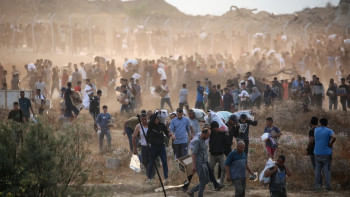Getting the math right
THE ninth parliamentary elections in Bangladesh saw a landslide victory for the Awami League. The high-turnout election also saw Bangladeshi voters turn away from the BNP and its alliance partner, Jamaat-e-Islami.
The Jamaat, which had captured 17 seats in the 2001 parliamentary elections, was reduced to 2 seats in the 300-seat parliament in the 2008 elections. For Jamaat in particular and religion-based politics in general, it was a resounding electoral defeat.
While Jamaat's share of seats in parliament dwindled in 2008, the party did manage to garner a similar percentage of the total vote in 2008 as it did in 2001. In 2001, Jamaat received 2.38 million votes out of a total of 55.73 million votes cast in the national elections, securing a 4.28 percent share in the total votes.
In 2008, Jamaat received some 3.16 million votes out of 70.51 million national votes cast in the election, marginally increasing its vote share to 4.48 percent of the total vote.
Looking at the total votes received by Jamaat in 2008, it may appear that while the party lost parliamentary seats, it has made a negligible gain in voter support since the last parliamentary election. However, a closer look at the election results reveals a much different scenario.
There are two factors to consider when examining Jamaat's share of the vote in this election.
First, Jamaat fielded candidates in nine more constituencies in 2008 than it did in 2001. In 2008, Jamaat competed in 40 constituencies, whereas in 2001 the party only fielded candidates in 31 constituencies. Jamaat competed in 25 of the 31 constituencies it ran in during the 2001 election, opting not to run in 6 of the 2001 constituencies. Fifteen of the 40 constituencies that Jamaat ran in were new for 2008.
Second, Jamaat's individual vote share is hard to separate from that of BNP's in constituencies where BNP candidates do not contest. Significant portions of BNP supporters in these constituencies opt to vote for Jamaat as no other right-of-centre candidates are on the ballot.
As was evident in the 1996 national election, when BNP and Jamaat contested head to head, Jamaat's individual vote share is very insignificant (less than a quarter of BNP's vote share).
Since the number of constituencies where Jamaat contested is not equal, to make a realistic comparison between Jamaat's election performances in 2001 and 2008, one needs to compare Jamaat's average vote count per constituency, instead of national share.
In 2001, Jamaat received some 76,947 votes per constituency, while the average national voter turnout per constituency was 185,761 i.e. 41.42 percent of national average.
In 2008 national election, Jamaat's average vote count per constituency was 79,051 i.e. only 33.52 percent of the national average of 235,836 votes.
Evidently, while Jamaat registered a higher number of votes by fielding more candidates, its average vote share went down significantly by almost 8 percent.
To get a clearer sense of how Jamaat fared in the vote count in 2008, we can take a look at the 25 constituencies where Jamaat ran both in 2001 and in 2008. In these constituencies, Jamaat received, in 2001, a total of 2.10 million votes out of a total of 4.97 million votes cast.
In 2008, in the same constituencies, Jamaat received some 2.16 million votes out of a total of 5.77 million overall votes cast. While the total number of votes cast in 2008 increased by 16.17 percent, Jamaat only managed to increase its total vote by 2.79 percent. In addition, in 12 of these 25 constituencies, Jamaat's total vote dropped in 2008 compared to 2001.
In 2008, the number of registered voters in these 25 constituencies had also increased by 8.69 percent from 6.23 million registered voters to 6.78 million voters. Yet, with voter turnout in these constituencies increasing from 79.71 percent to 85.20 percent between 2001 and 2008, Jamaat's share of votes as a percentage of all registered voters also dropped.
By comparing constituency results between the 2001 and 2008 elections, it is apparent that Jamaat not only suffered a significant electoral loss in 2008, but it also now holds support with a smaller share of the electorate. Jamaat has mitigated some of this loss of support in existing constituencies by fielding candidates in additional constituencies.
The media have attributed Jamaat's religion-based politics and the nationwide anti-war criminal campaign as factors that have contributed to its electoral slide. However, in the absence of credible exit polling, it is difficult to determine which factors held sway with the voters.
Nonetheless, empirical analysis of the data shows that Jamaat's decline in 2008 is both real and substantial. Whether this signals a long-term trend away from Jamaat and religion-based politics should become clearer in the next few election cycles.

 For all latest news, follow The Daily Star's Google News channel.
For all latest news, follow The Daily Star's Google News channel. 



Comments